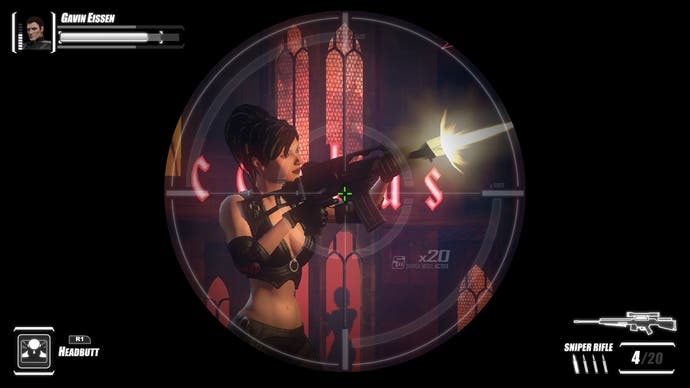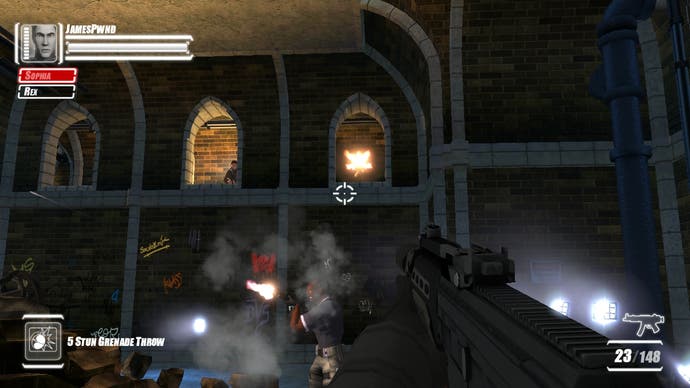The Agency
An agent of change.
Each role has its own progression built into the game, with a number of titles available to it for each rank (or overall level) your character gains within its home Agency. There's also a separate weapons experience track that unlocks skills and improvements for the game's various weapon families. "So, as opposed to one monolithic level ding that you're shooting for, we have this very broad assortment of dings that you're going for at any given moment," says Milton.
Clothes define even more than your class, however. The game's Alias disguise system - if we're talking A-Team dynamics, this one is the Face - is at the heart of non-combat gameplay. Don a disguise and an alias rating tracks how deep your cover is - "like ammo or health, as AI perceive you, they're doing damage to that alias rating as sure as if they were shooting you," says Milton. That can be mitigated by using an "act natural" skill or doing something inconspicuous - stopping at a bar for a drink, for example.
The example in the demo is a simple tail through city streets, but Milton describes a more elaborate nightclub infiltration that is almost a maze puzzle, and says team dynamics for the alias system are also in the works. Intel gathering through photography and other means is another major non-combat mechanic for the game; collecting intel in turn unlocks missions and operatives, and feeds into the crafting system.
The demo takes us behind a flower-shop façade into a UNITE field office. The office is home to some light relief in the form of a Q-Bert arcade machine (although even this ties into the game world - clearing it will unlock an operative) and some comical Q-style R&D vignettes (again - take pictures for intel and more unlocks). Mini-games, which will naturally include casino games, will be roughly divided between "Flash-style" diversions like Q-Bert, and more physical in-game interactions, with some - on a hacking, lock-picking or surveillance theme, say - integrating with mission play.

The demo we're shown takes place in the game's second act, set in Europe (the two locations we catch wind of in our time at the studio are Prague and Panama). The Agency seems to feature an unusually structured storyline for an MMO - albeit one that's some hundred hours long - with acts in which multiple plots, including separate paths for Paragon and UNITE, gradually converge on a single bad guy.
The globe-trotting, Earth-set theme necessarily means the game is going to be geographically broken up rather than a single contiguous world. It'll be based on a hub-and-spoke system with social hubs leading to private and public encounters - some of the spokes may be gameplay challenges, we're told, which leads us to suspect that the game's vehicles may come into play here. "So, you know, it's Diddy Kong Racing", Milton sums up, adding that there will be combat areas simultaneously open to large numbers of players. "We're not going to segregate everybody, we want to have happenstance encounters between players who find themselves magically in the same space shooting at the same bad guys."

In another break with MMO tradition, missions are designed to be playable by either solo players or groups - and not by scaling the bad guys' hit points to match, either. Rather, there will be several levels of objectives to a mission, with bronze ratings advancing the story and being simple to solo, silver requiring a high-level skill or several players, and gold a well-organised full party, with better rewards to match. Most missions are intended to last half an hour or so; while there may be some that require groups, they won't be part of the main story arc. Milton mentions one intriguing prospect: group encounters that are "crossovers" between AI and player-versus-player threat in the same space.
Just as important as your teamwork with other players, however, will be your roster of operatives. These collectible NPCs - essentially characters as equipment - are perhaps the bravest concept in The Agency: the one with the most potential, but also fraught with challenges in terms of design and content-creation for SOE's Seattle team. There will be some 400 of these operatives, varying in rarity, quality and value; your roster can include 50 to 100 of them, of which you'll be able to have an active "hand" of five to ten. Some operatives might have extremely limited runs - say 100 in total - and become very valuable as a result.

